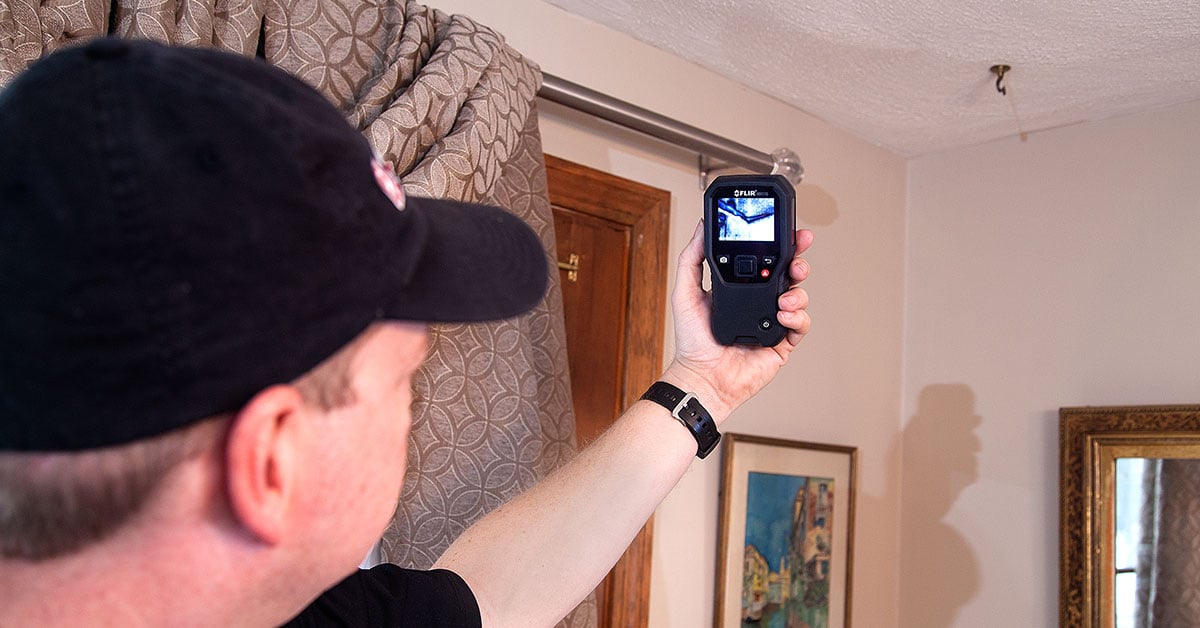Exactly How Professional Water Leak Detection Can Save You Cash and Avoid Damages
Wiki Article
Innovative Solutions for Very Early Detection of Water Leakages in Buildings and Framework
As the stability of buildings and facilities is critical, the difficulty of very early detection of water leaks has spurred ingenious options that promise to change the way we protect against possible problems. From innovative leakage detection technologies to the implementation of IoT sensors for real-time tracking, the landscape of leakage avoidance is evolving quickly. Artificial intelligence algorithms offer a glimpse into the future of leakage prediction, while thermal imaging offers a non-intrusive method for pinpointing hidden leakages. Automated water circulation evaluation systems are improving how leaks are determined and attended to, paving the method for a positive technique to water leakage discovery. Each of these options holds the vital to making sure the dependability and longevity of our built atmosphere, motivating a shift towards a much more sustainable and reliable future.Advanced Leakage Detection Technologies
Advanced leakage discovery innovations, equipped with cutting-edge sensing units and formulas, play an essential duty in promptly recognizing and determining water leaks in different settings. Electro-magnetic sensing units can identify changes in electromagnetic areas created by water, supplying yet one more layer of leak discovery ability.
IoT Sensors for Real-Time Tracking
In the world of modern water leak detection, the integration of IoT sensing units for real-time surveillance stands for an essential development in boosting positive leakage discovery capacities. These sensors provide constant tracking of water systems, providing real-time information on water circulation prices, pressure variations, and temperature adjustments. By leveraging IoT innovation, these sensing units can discover even the tiniest anomalies in water usage patterns, making it possible for very early recognition of potential leaks prior to they escalate right into significant issues.IoT sensors transfer information to a centralized platform, where innovative formulas assess the information and generate informs or notifications when irregularities are detected. This real-time tracking capacity enables residential or commercial property owners or facility managers to promptly resolve leakages, decreasing water damage, minimizing repair service costs, and conserving water sources.
Furthermore, IoT sensing units can be integrated with structure monitoring systems, enabling automated actions to spotted leaks, such as turning off water valves or activating pumps to minimize the impact of leaks. On the whole, the execution of IoT sensors for real-time monitoring significantly improves the efficiency and effectiveness of water leak detection in structures and infrastructure.
Artificial Intelligence Algorithms for Leak Prediction

One secret advantage of utilizing artificial intelligence for leak forecast is its capability to continually learn and boost its accuracy gradually. As even more find out this here data is gathered and fed into the algorithm, it can refine its predictions and adjust to changing problems, inevitably boosting the integrity of leakage detection systems.
Moreover, artificial intelligence formulas can help in determining subtle signs of leaks that might go undetected by typical surveillance methods. water leak detection. By assessing intricate data collections in real-time, these formulas can give very early warnings and informs, permitting timely intervention and precautionary upkeep to reduce possible water damages and linked expenses
Utilizing Thermal Imaging for Leakage Discovery
Thermal imaging technology uses a promising technique for finding water leaks in numerous systems and infrastructures. By using infrared radiation and temperature variances, thermal imaging cameras can determine covert leaks that are not quickly visible to the naked eye. When water escapes from pipelines or frameworks, it frequently transforms the temperature of the bordering try this site area, developing temperature differentials that thermal cameras can capture. These temperature abnormalities are after that converted into noticeable photos, highlighting the specific area of the leak.One of the crucial benefits of thermal imaging for leakage discovery is its non-intrusive nature. Unlike traditional approaches that might require burglarizing walls or floorings to locate leaks, thermal imaging enables non-destructive screening. This not only saves time and minimizes prices yet additionally decreases disturbance to the building or framework being analyzed. Furthermore, thermal imaging can quickly scan big locations, supplying a comprehensive summary of prospective leak sources in a prompt way. Overall, making use of thermal imaging innovation improves the performance and precision of water leakage detection, making it an important tool for keeping the honesty of structures and facilities.
Automated Water Circulation Analysis Equipments
Exactly how can automatic water circulation analysis systems reinvent the discovery and monitoring of leakages in various systems and infrastructures? Automated water circulation evaluation systems provide a proactive approach to leakage detection by continuously monitoring water circulation prices and patterns. By developing standard data, these systems can quickly recognize deviations that might indicate a leakage, enabling prompt intervention to avoid extensive damage.These systems use sophisticated formulas to evaluate real-time information and provide immediate informs when anomalies are identified, enabling speedy activity to be taken. In addition, computerized water flow analysis Clicking Here systems can be integrated with building administration systems or IoT platforms, boosting overall effectiveness and making it possible for remote surveillance abilities.
In addition, the data collected by these systems can be used for anticipating upkeep purposes, helping to recognize prospective weak points in the infrastructure prior to leakages take place. Generally, the implementation of computerized water circulation evaluation systems can significantly boost leakage detection and management practices, eventually leading to set you back savings, reduced water wastefulness, and increased sustainability in structures and facilities.

Conclusion
To conclude, the integration of innovative leakage discovery innovations, IoT sensing units, machine understanding algorithms, thermal imaging, and automated water circulation evaluation systems offers innovative services for very early detection of water leakages in structures and framework. These technologies make it possible for real-time monitoring, prediction of leakages, and reliable detection methods to protect against water damage and wastage. Applying these options can assist in preserving the honesty and sustainability of water systems in numerous settings.Report this wiki page